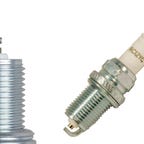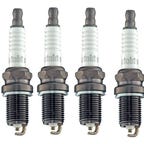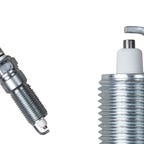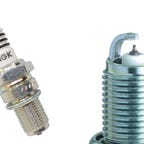 Why You Can Trust CNET
Why You Can Trust CNET Best Spark Plugs for 2022
Spark plugs are a mission-critical part of a gasoline engine's ignition system. Without them, there's nothing to ignite the air-fuel mixture in each cylinder.
Are you someone who drives a gas-powered car? Has there ever been a time when you've thought about your car's ignition system? If your answer is no, don't worry -- you are definitely not alone. Spark plugs, coil packs and high-tension leads are your vehicle's unsung under-the-hood heroes as they play one of the most important roles in the four-stroke combustion cycle. These parts join forces to ignite the delicately balanced mixture of air and fuel in each cylinder, which is ultimately what sends you zooming on down the road.
The business end of an ignition system is the humble spark plug. On the surface, these cylindrical, threaded components seem simple, but there's an incredible amount of engineering that goes into each one. Beyond that, there's a dizzying array of spark plugs on the market, with specific designs for everything from lawnmowers to race cars. There are different electrode materials and plug lengths, heat ranges vary based on application and some spark plugs are intended strictly for turbocharged or supercharged engines.
But what's the best kind of spark plug to buy if it's time to replace them in your ride? Well, this is actually an easy question to answer. Hans Lipp, director of ignition application engineering at DRiV Motorparts, a division of Tenneco, summed it up best, "[Make sure] the spark plug that you put into your engine is actually recommended for this specific engine," especially the heat range. If you don't do this, he added, "very, very bad things can happen." Manufacturers provide specific information about the plugs you should use, part numbers that can easily be cross-referenced to find compatible plugs from different manufacturers if you don't feel like purchasing an OEM spark plug.
Demystifying things, this guide highlights some of the best spark plugs on the market today and delves into related terminology. Our recommendations in various categories are based not only on expert knowledge but also real-world customer reviews.
If you drive a low-performance vehicle or have a classic car, you can probably get away with running copper-core spark plugs. These should also work well in small engines, like ones on lawnmowers, chainsaws or string trimmers. No, a copper spark plug doesn't last as long as newer designs and they may not perform as well, but in certain cars and trucks they're all that's needed, plus they're super affordable; these Champions go for just about five bucks apiece. With a corrosion-resistant body and a copper core for reliable performance, they should provide years of trouble-free service. Icing on the cake, these copper plugs are also highly rated, having received 4.8 stars out of five after more than 3,750 customer reviews.
If you've determined that a copper plug will work in your particular application and you don't want to spend any more hard-earned money than necessary, consider these super-affordable Autolites. Sold in four-packs, these plugs sticker for about $10, or roughly just $2.50 apiece. Sure, these no-frills copper core spark plugs are a bargain, but don't let that low, low price fool you: The Autolite is still a solid product, one that carries an impressive 4.7-star rating.
For greater performance than copper-core spark plugs provide, consider stepping up to platinum. Plugs incorporating this precious metal should last longer and deliver more spark energy to each cylinder. The Denso Platinum TT spark plug should also improve fuel economy, enhance acceleration and provide quicker engine starts. This design features a platinum-tipped center electrode, which fires against a titanium-enhanced ground strap. The purified alumina powder insulator is designed to withstand extreme stress and deliver excellent dielectric strength and thermal conductivity. These Denso spark plugs are a great value, and they're highly regarded, having earned a 4.6-star rating after nearly 1,000 customer reviews.
Double-platinum spark plugs are another step up the ladder. They feature platinum on both the center and ground electrodes, a more efficient design than what's found on a standard platinum plug. This double platinum spark plug configuration should provide many of the same benefits -- like greater performance, enhanced engine smoothness and better efficiency -- but they should last even longer than regular platinum spark plugs. Champion's heat-active alloy is expected to help these plugs maintain a stable operating temperature under all driving conditions for strong performance across the board. With a rating of 4.5 out of 5 stars, they clearly deliver on their promises. And at less than 5 bucks a pop, there's no reason not to consider a set when it's time to change spark plugs.
Movin' right along, iridium-tipped spark plugs should provide even greater performance and longevity than double-platinum plugs, since this silvery transition metal has a high melting point. The NGK Iridium IX spark plug is designed for performance enthusiasts, claiming to deliver enhanced throttle response and superior resistance to fouling thanks to its long insulator nose. Keeping combustion gasses where they belong (that is, in the cylinders) is a triple-layer gasket. The anti-corrosion trivalent metal plating on the body and threads of these iridium plugs reduces the likelihood of them getting stuck in a vehicle's cylinder head, even after many years of hard service. As for customer ratings, this iridium spark plug has earned 4.7 stars out of five after nearly 1,300 reviews.
In the world of gasoline-engine ignition, NGK's Ruthenium HX spark plugs sound like the cat's pajamas. Designed to last for the long haul in today's fuel-efficient, high-output engines, these plugs promise maximum durability and service life in turbo and direct-injected applications. Thanks to their high ignitability, these plugs promote a more complete fuel burn for quicker throttle response, smoother idling and better cold starts. With their superior oxidation resistance and the ruthenium alloy's greater durability, these could be the last spark plugs you ever need to buy, which is helpful in engines where the plugs are difficult to access, such as a transversely mounted V6.
It's great if you've decided to replace the spark plugs in your vehicle, but you can't do it without the appropriate tools. Since most spark plugs are buried deep inside the cylinder head, you can't just unscrew them with a wrench, you need a special socket and a ratchet, likely with an extension. Ensuring you have exactly what you need is this five-piece spark-plug socket set from Ares. In addition to an organizer, it includes a 14-mm and an 18-mm socket, as well as 5/8, 3/4 and 13/16 on the imperial scale. With these tools you'll have nearly everything you need to remove just about every kind of spark plug out there. And unlike conventional sockets, these feature a small rubber doughnut inside that holds the spark plug in place as you install it. This prevents you from dropping the plug, which could change the gap, resulting in poor engine performance. Aside from being super handy, this set is affordable at about $19.
Before installing any spark plugs, you have to gap them first, or precisely set the distance between the center and ground electrodes, which is measured in millimeters or thousandths of an inch. Automakers specify a certain gap for each vehicle, which is optimized for the application. This CTA Tools ramp-style spark-plug gapper is easy to use and affordable. Plus: It's so small, it fits on a keyring.
Easier to use than a ramp-style gapping tool, feeler gauges give you a precise spark-plug gap every time. If your vehicle manufacturer specifies a gap of 35-thousandths of an inch (0.035), then just fan out a 15-thousandths and a 20-thousandths feeler and you're good to go. If the gap is too wide, just tap the spark plug on a flat surface to close it up so the feelers have some drag. If it's too tight, bend it to open it more. Feeler gauges can also be used in other applications beyond just setting spark-plug gaps.
Comparison of best spark plugs for 2022
| Product Name | Price | Features | Advantages | |
| Best copper-core spark plug | Champion Copper Plus | $6 | Corrosion-resistant body, copper core | Highly rated, good for small engines and classic cars |
| Best super-affordable spark plug | Autolite Copper Core | $10 for 4 | Copper core | Highly rated, affordably priced, good for small engines and classic cars |
| Best platinum spark plug | Denso Platinum TT | $6 | Platinum-tipped electrode, titanium-enhanced ground strap, tough purified alumina powder insulator | Better performance and longevity than copper plugs, highly rated, very affordable |
| Best value-priced double-platinum spark plug | Champion Double Platinum | $5 | Double platinum electrodes for greater durability, heat-active alloy construction | Even better performance and longevity than standard platinum spark plugs, super-affordable price, highly rated |
| Best iridium-tipped spark plug | NGK Iridium IX | $8 for 1 or $25 for 4 | Anti-corrosion trivalent metal plating, resistance to fouling thanks to long insulator nose, enhanced throttle response | Long-term durability, better performance than double platinum, high ratings |
| Best high-end spark plug | NGK Ruthenium HX | $16 | Latest and greatest spark-plug design, super long-lasting ruthenium electrodes | The best performance and longevity |
Spark plugs, deceptively simple, important.
Important things to know about spark plugs
- Many modern spark plugs are designed to last for ages, in some instances 100,000 miles or more. This longevity is largely thanks to advanced electrode materials such as platinum and iridium. But just because a certain set of spark plugs can technically go that distance doesn't mean it's a good idea to run them that long. "You don't necessarily want to leave your spark plugs [in] if you're not driving your car that much for 10 years or 15 years," said Lipp. It's not that they go bad but, "Removability can become an issue at some point in time." Rust and corrosion can make the plugs a challenge to take out and can even damage the cylinder head they screw into, which can lead to costly repairs. "Spending $20 [or] $30 on a set of plugs is not a huge amount of money every few years," said Phil Berry, product and project manager of global ignition at DRiV Motorparts, a division of Tenneco, which is cheap insurance against future issues.
- When you do buy replacement spark plugs, it's critical to run the recommended spark plug type for your vehicle's engine. Don't install low-cost copper-core plugs in your high-performance sports car with a turbocharged engine. Make sure to purchase the right spark plug type specified by the manufacturer. "You do not want to downgrade it," said Berry, not unless you want to risk engine damage. Moving upward, however, should not be an issue, that is, going from copper-core plugs to platinum, or double platinum to an iridium plug.
- Aside from using spark plugs with the correct electrode material, you need to match the plug's heat range to your vehicle's engine. This is another parameter specified by the manufacturer. What is the heat range? Lipp explained it's basically a measure of the thermal management of a spark plug, with colder plugs having higher thermal conductivity, dissipating more heat to the engine than hotter plugs. He said, "A spark plug needs to get up to operating temperature as quickly as possible." If not, soot can form on it, which acts like a resistor, taking energy away from the spark. If this resistance gets too high, the plugs won't fire at all. "But on the other hand, you need to make sure that when you ... run for extended periods at very, very high load and your operating temperature is very high, you must never exceed your allowable operating temperature," which could also ruin the plugs. "I always say," noted Lipp, "you need to go as hot as possible but as cold as necessary." Heat range is another area where it's best to follow the manufacturer's recommendation.
- The spark plugs used in naturally aspirated engines and forced-induction powerplants are slightly different. Spark plugs specified for the latter type of engine are usually more robust. "We are increasing the mechanical integrity of the spark plug," said Lipp,since boosted engines often make more power and have higher cylinder pressures. The materials used can also be different.
- Before installing a new set of spark plugs you need to gap them first. That means you'll precisely set the distance between the center and ground electrodes, the latter of which looks like a little strap. This electrode gap figure, measured in millimeters or thousandths of an inch, is measured with a set of feeler gauges or a special tool designed specifically for setting new spark plug gaps, both of which are easy to use and affordable. Right out of the box, spark plugs will often be gapped close to what they need to be, but you should always double-check this as the ground electrodes can get bent during shipping and handling, closing the gap up. If a gap is too narrow, just bend ground electrode away from the center electrode, and conversely, if the gap is too wide, gently tap the ground electrode to narrow the distance between them.
- When shopping for new spark plugs, it's best to steer clear of ones that have multiple electrodes. Berrysaid these multipronged designs were a way of adding life to plugs in the past, "But that technology is pretty much gone now." Lipp added, "Nobody is using multiground electrodes anymore," because it reduces combustion quality and can cause noticeable rougher engine performance. "In the end," he said, "it's a thing of the past."
How to install new spark plugs
- When installing a new set of spark plugs, start them by hand to avoid cross threading, which can damage the cylinder head. Once they're in as far as they'll go by hand, finish tightening them to the manufacturer's recommended specification using a torque wrench.
- There's some debate as to whether you should apply anti-seize (or different lubricants) to the threads when installing plugs. Lubricating the threads reduces corrosion, which can make it far easier to remove the plugs down the road. Heavily corroded spark plugs can damage the cylinder head during extraction and that is not good. The downside to lubricating spark plug threads is that it can lead to over-torquing, which can potentially distort the plugs or even break them. Doing so can also cause cylinder leaks and other issues. Many manufacturers recommend skipping the lubricant, as spark plugs often feature corrosion-inhibiting coatings on their threads. If you decide to use lubricant, however, NGK says to reduce the overall torque figure by around 20% to avoid over-tightening and the problems it can cause.
- When it's time to buy new spark plugs, Lipp has one important recommendation: Buy them from a reputable source. "There are lots of fakes out there," he said. You're probably far less likely to get counterfeit spark plugs if you go to your local AutoZone or shop on Amazon than if you buy from eBay or some other spurious website. "I think in my opinion, that is a very, very cheap insurance," he added.
- Once again, the most important spark plug-related tip is this: Follow the vehicle manufacturer's recommendations; don't experiment. If you do this when it's time to buy new plugs to replace your worn spark plugs, your car or truck should have no issues with its ignition system for many years to come.
Which spark plug is best for your vehicle? It's important to follow the manufacturer's recommendation or bad things can happen.
Choose the right spark plug for your application
From affordable copper-core models to ones fitted with iridium electrodes, there's a dizzying number of different spark plugs on the market today. You can get plenty of use out of a more-affordable set of plugs, especially if you plan on changing them more regularly than the manufacturer recommends. But you can also buy top-of-the-line spark plugs if you never want to think about them or if they're particularly difficult to change, such as on a transversely mounted V6 engine.
When changing out your ride's spark plugs, go slowly, work carefully and, at the risk of sounding like a broken record, follow the vehicle manufacturer's recommendations. Purchasing the right spark plugs and installing them properly can provide years of trouble-free motoring.
Read more: Best Spray Car Wax for 2022






